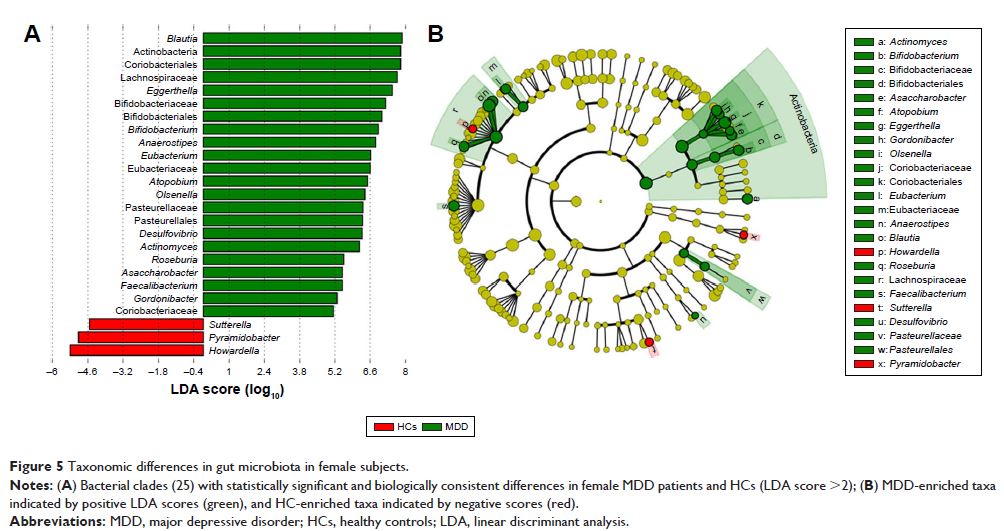108985
论文已发表
注册即可获取德孚的最新动态
IF 收录期刊
- 3.4 Breast Cancer (Dove Med Press)
- 3.2 Clin Epidemiol
- 2.6 Cancer Manag Res
- 2.9 Infect Drug Resist
- 3.7 Clin Interv Aging
- 5.1 Drug Des Dev Ther
- 3.1 Int J Chronic Obstr
- 6.6 Int J Nanomed
- 2.6 Int J Women's Health
- 2.9 Neuropsych Dis Treat
- 2.8 OncoTargets Ther
- 2.0 Patient Prefer Adher
- 2.2 Ther Clin Risk Manag
- 2.5 J Pain Res
- 3.0 Diabet Metab Synd Ob
- 3.2 Psychol Res Behav Ma
- 3.4 Nat Sci Sleep
- 1.8 Pharmgenomics Pers Med
- 2.0 Risk Manag Healthc Policy
- 4.1 J Inflamm Res
- 2.0 Int J Gen Med
- 3.4 J Hepatocell Carcinoma
- 3.0 J Asthma Allergy
- 2.2 Clin Cosmet Investig Dermatol
- 2.4 J Multidiscip Healthc

重性抑郁症患者肠道微生物群的性别差异
Authors Chen JJ, Zheng P, Liu YY, Zhong XG, Wang HY, Guo YJ, Xie P
Received 8 December 2017
Accepted for publication 11 January 2018
Published 26 February 2018 Volume 2018:14 Pages 647—655
DOI https://doi.org/10.2147/NDT.S159322
Checked for plagiarism Yes
Review by Single-blind
Peer reviewers approved by Dr Andrew Yee
Peer reviewer comments 2
Editor who approved publication: Professor Wai Kwong Tang
Objective: Our previous studies found that disturbances in gut microbiota
might have a causative role in the onset of major depressive disorder (MDD).
The aim of this study was to investigate whether there were sex differences in
gut microbiota in patients with MDD.
Patients and methods: First-episode drug-naïve MDD patients and
healthy controls were included. 16S rRNA gene sequences extracted from the
fecal samples of the included subjects were analyzed. Principal-coordinate
analysis and partial least squares-discriminant analysis were used to assess
whether there were sex-specific gut microbiota. A random forest algorithm was
used to identify the differential operational taxonomic units. Linear discriminant-analysis
effect size was further used to identify the dominant sex-specific phylotypes
responsible for the differences between MDD patients and healthy controls.
Results: In total, 57 and 74 differential operational
taxonomic units responsible for separating female and male MDD patients from
their healthy counterparts were identified. Compared with their healthy
counterparts, increased Actinobacteria and decreased Bacteroidetes levels were
found in female and male MDD patients, respectively. The most differentially
abundant bacterial taxa in female and male MDD patients belonged to phyla
Actinobacteria and Bacteroidia, respectively. Meanwhile, female and male MDD
patients had different dominant phylotypes.
Conclusion: These results demonstrated that there were sex
differences in gut microbiota in patients with MDD. The suitability of
Actinobacteria and Bacteroidia as the sex-specific biomarkers for diagnosing
MDD should be further explored.
Keywords: major
depressive disorder, MDD, gut microbiota, biomarker
